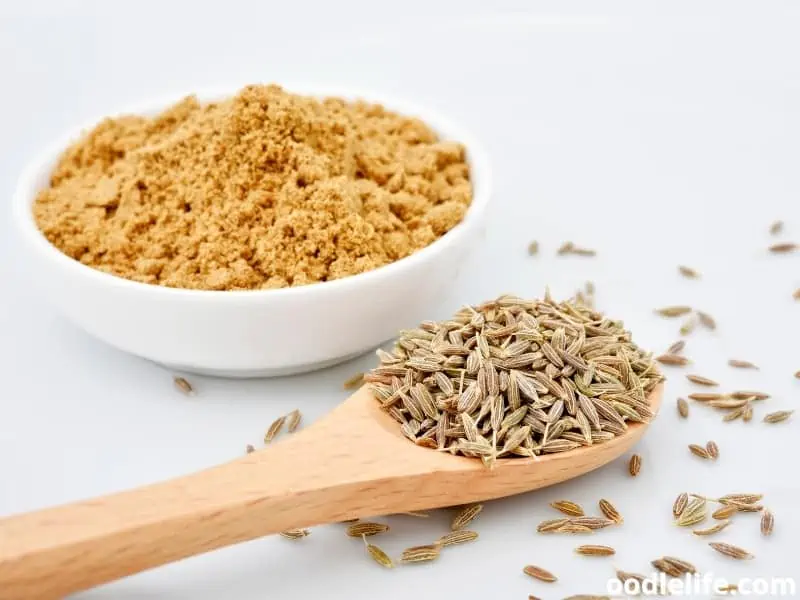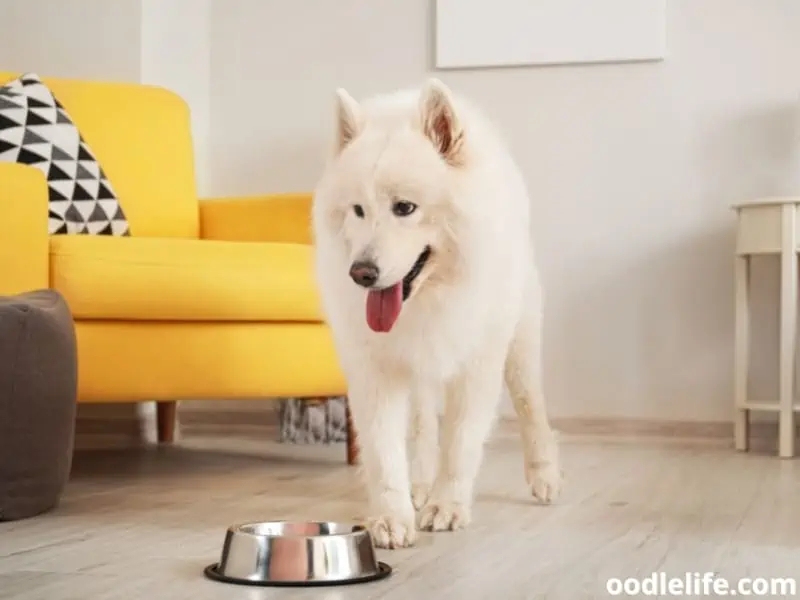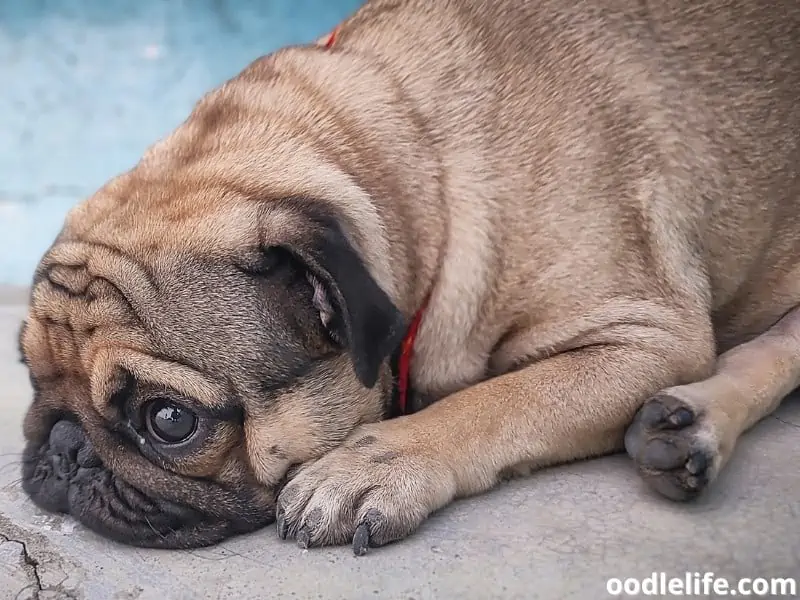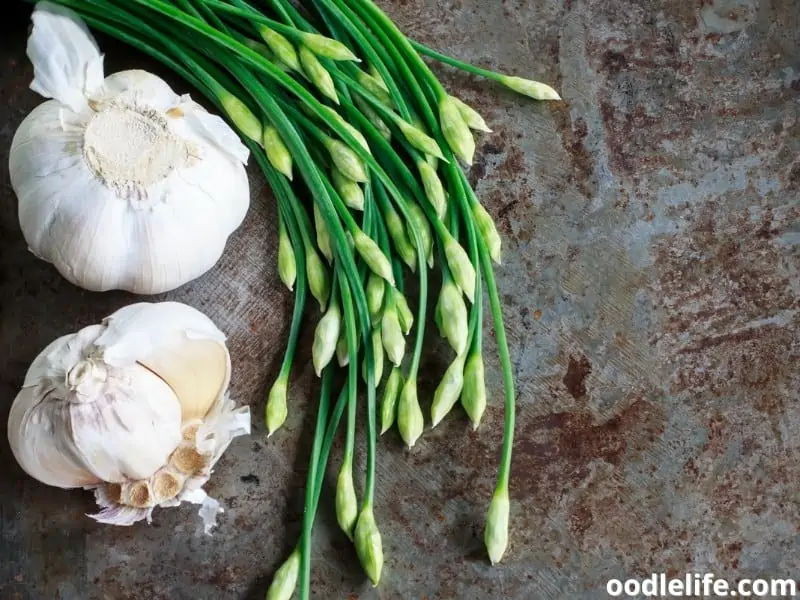Can Dogs Eat Cumin (Safety) Seeds and Powder?
Dog owners know that certain dogs will try to eat anything and everything. If your pup has gotten into something he shouldn’t have, you may be scouring the web to see if what he ate was safe or not.
One common spice found in household pantries is cumin. An aromatic seed closely related to parsley, cumin is sold primarily in spice form and used in countless dishes. It comes from Central Asia originally and is most prevalent in Spanish, Persian, and Indian Dishes.

In fact, it is not uncommon for some owners to season their dog’s food with cumin and other spices.
So, can dogs eat cumin? The short answer is yes, but only in minimal amounts. If your dog has perhaps helped themselves to something flavored with cumin, they will probably be just fine.
However, in large amounts, cumin is likely to cause severe indigestion, loose stool, and vomiting. If these symptoms arise, seek veterinary care right away.
How Much Cumin Can Dogs Eat?
The amount of cumin your dog can eat depends on how much they weigh. Larger dogs can safely have up to a teaspoon, while smaller dogs should have no more than a quarter of a teaspoon. Older dogs and puppies tend to have more sensitive stomachs and should not be offered cumin.

Cumin is a very flavorful spice; it does not take much when adding it to a dish. If you are flavoring your dog’s food with cumin, the above doses should be more than enough to get their attention. You may want to start with a smaller amount for the first time to see if they like the taste.
Is Cumin Good for Dogs?
While some minor health benefits potentially can come from giving your dog cumin, often, the intestinal issues that go with it are not worth it. However, if your dog has a strong stomach and doesn’t seem to be affected, adding cumin to its diet might be helpful.

Cumin, in both spice and seed form, contains manganese, iron, and vitamins A, E, and C. These vitamins and minerals can potentially boost the immune system and increase energy in dogs. However, there are no proven cases of health benefits from cumin for dogs.
Regular daily use of cumin in dog food is likely to irritate their stomach lining, which can cause cramping and discomfort. Because of this, using cumin for health benefits is not recommended. There are plenty of alternative options if you are looking to boost your dog’s health.
Why Can Cumin Be Harmful to Dogs?
While cumin is not considered toxic to dogs, it is still a potential hazard. Aside from the stomach upset generally caused by consuming cumin, there are several other potential health risks to giving it to your dog.

When consumed in large doses, the intestinal problems caused by cumin can also lead to liver damage, eventually leading to death. Additionally, the high iron levels in cumin can potentially harm your dog. If they have any health issues such as hemochromatosis or liver disease or are on blood thinners, it’s best to avoid cumin.
Dogs that experience stomach issues from overeating cumin usually return to normal within a day or two. However, during that time, it’s essential to look for signs of dehydration or lethargy, which can come from excess vomiting and diarrhea. If you notice any of these symptoms, or if the problems persist for more than 24 hours, seek veterinary help immediately.
Spice Alternatives To Flavor Your Dog’s Food
If you have been using cumin to flavor your dog’s food, it may be wise to find an alternative option. There are plenty of other spices and herbs that are entirely safe for dogs and are also delicious. Here are a few of our favorites:
- Cinnamon
- Dill
- Ginger
- Oregano
- Parsley
- Basil
- Cilantro
- Rosemary

Like any food, the above list should be consumed in moderation. If you are unsure about whether or not to feed something to your dog, consult your vet first.
Toxic Foods To Watch Out for
Unlike cumin, which can be consumed in small doses, several other spices and foods are considered toxic to dogs, even in trace amounts. Many of these things are often found in most household kitchens, and some dog owners may not be aware of the potential risk.
Chives
In the same family as leeks, onions, and garlic, all of which are toxic to dogs, chives contain organosulfoxides, which are extremely dangerous for your pup. Additionally, symptoms of chive poisoning sometimes may not show up for several days, so it’s essential to keep them under careful observation during that time.

Xylitol
You may not recognize the name at first, but xylitol is an artificial sweetener found in many foods. Many chewing gum brands contain xylitol, as well as many “sugar-free” products such as peanut butter, candy, drinks, and baked goods.

Upon consuming xylitol, dogs may experience a rapid surge in insulin and a drop in blood sugar. Even trace amounts of xylitol can cause hypoglycemia in dogs, leading to liver failure and even death.
Chamomile
While chamomile has many beneficial properties when used externally, it can be toxic to dogs when ingested. Small amounts may cause stomach upset, including vomiting and loose stool. However, in severe cases, chamomile can cause liver damage, anorexia, and even death.

Conclusion
So, can dogs eat cumin? In short, dogs can safely eat cumin powder or cumin seeds in small amounts. However, more than the recommended dosage is likely to cause discomfort. Because of this, it is probably for the best that you find another option if you are looking to add a little extra flavor to your dog’s food.
If your pup has gotten into some human food that contains cumin, it may experience loose stool for a day or two and then be okay. If problems persist, seek veterinary care. Some dogs are more likely to have trouble digesting cumin than others, and it can largely depend on the size, breed, and age of your dog.
For more information on toxic foods, you can also check out this list of 11 Spices That Can Kill Dogs.